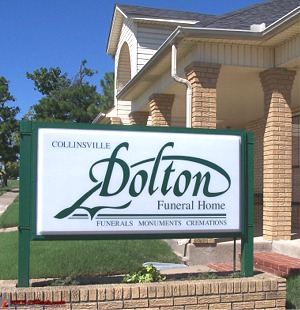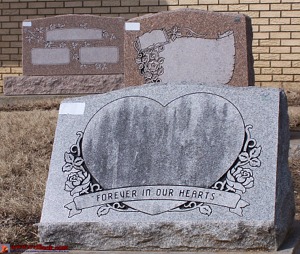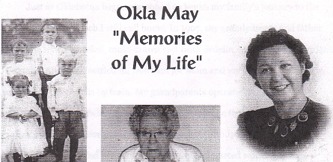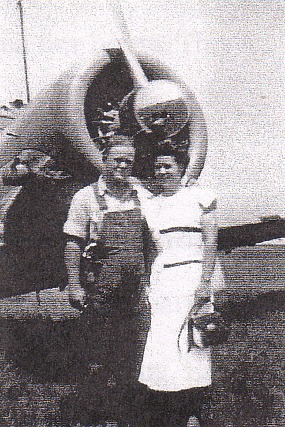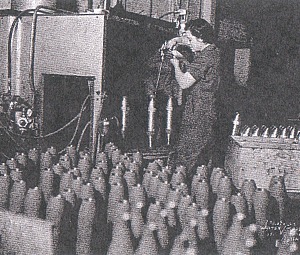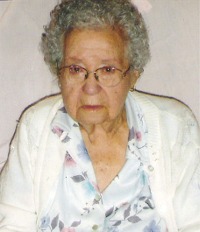Written
by: Missy DeLozier (As told by: Okla May Evans Newman) Just
as Oklahoma began statehood so began my family's journey to the wonderful land
in which I still call home. In 1907, my grandparents and father traveled in a
two-wheeled, mule-grawn cart from Sedelia, Missouri to Drumright, Oklahoma. After
they settled in, Dad sent for Mom and my brothers to come to Oklahoma from Sedelia
by train. My grandparents operated the first boarding house for oilfield workers.
Granny became the first telephone switchboard operator for the Drumright area
and Grandpa had a blacksmith shop. My parents settled near Oilton where my dad
started working in the oilfields. I
was born in Oilton, Oklahoma on January 8, 1910 to George and Annie Evans. My
parents couldn't agree on a name for me so they just called me Sis because I had
three olders brothers. One day someone from the Census Bureau came to our house.
He took down our family information and asked for all of our names. He was told
that my name was Sis. He told my parents that nicknames were not acceptable. Mom
told him that if he needed a name for his records he would have to give me one
himself. So, he did! He wrote down the abbreviation for the state where he lived
and the month in which he visited our home. This is how I got my legal name, Okla
May Evans. When
I was about five years old, my parents joined a group of people who were planning
to travel to Wilburton, Oklahoma to homestead property where free land was being
offered. We found plenty of fish, wild game, berries and fruits for eating and
clear streams for drinking, washing and bathing. Each evening the men would find
a place to camp near the water. One evening it was my mother's turn to use the
camp stove to bake bread for our family. Before the bread was done, some Indians
rode up on horses and began yelling and circling the campsite. We had to move
out quickly. Mom grabbed our half-baked bread and the men dumped the burning wood
out of the stove. When we left the camp site the Indians did not chase us. They
just wanted to scare us away from their land. I was very afraid of Indians after
that incident. The
men then took us to a distant cave because they feared another encounter with
the Indians. Women and children bedded down in the cave. The wagons were placed
in a half-circle in front of the cave to form a corral for the stock. The men
rested on the ground under the wagons. They took turns sleeping and guarding the
campsite throughout the night. Every
so often, along our journey, we came upon a country store where we could replinish
our supplies. A sack of soda crackers from a barrel was a treat for the children.
We purchased bologna in long sticks. I got in trouble for sticking my finger in
the bologna and licking it off. Mom always knew whenever I did it because that
one finger would be clean and the rest were dirty. At
one point during the trip, we had to get out of our wagon and walk because the
road travelled up and around a hill and it was too steep for us to ride in our
wagons. As the horses walked slowly up the hill, the wagon tipped over onto its
side and slid down the hill. The wagon tongue broke loose and the horses were
able to escape injury. Several men had to attach ropes to the wagon and pull it
upright. They were eventually able to pull it back onto the road and repair it. I
can never recall a time when we weren't with our parents. We were blessed in that
way to have the security of a mother and father by our side every day and every
night. In cold weather they would cover the bottom of the wagon with hay and then
lay down a quilt. If it was raining they would put a tarp over it. It was a dangerous
journey but we were never cold, wet or hungry. Many
times during the wagon train trip we could look off into the distance and see
a man on a white horse. He followed the wagon train most of the way to Wilburton.
The adults decided that the man must have been a lawman who had been assigned
to watch over us as we traveled across the wilderness. After
we made the long journey to Wilburton and were settled for a short time, my parents
decided they didn't like the area and the homestead situation. They decided to
return to Oilton. Dad ran a ferryboat crossing service on the Cimarron River at
Oilton for a while. He later became a worker in the vast oilfield business. Once,
when we were living on an oilfield lease, a horrible fire broke out. An oil tank
rod was struck by lightning and the fire quickly spread over a large area between
Oilton and Drumright. Burning oil boiled out of tanks into nearby streams causing
bridges and everything in its path to burn, I remember black smoke filling the
sky, fire all around us and holding tightly to Mom's hand. I thought the world
was coming to an end. Oilfield workers had to use dynamite to help put out the
fires. These constant explosions made it even more terrifying. It
was during the days that we lived in Oilton that I recall most of my childhood
memories. My brothers and I were into constant mischief. My grandmother loved
to piece together quilts. One day she ran out of thread and my dad bought her
a new spool. My brother George and I overheard them talking about how many yards
of thread were on that spool. We were courious as to how long they were really
talking about so when grandmother wasn't looking we took that spool of thread
and went outside. I told George that I thought it would stretch all the way to
China. George put a stick in the hole of the spool and I began walking and stretching
it out. We completely unwound all 150 yards of the thread. Later when my dad walked
to work he got all tangled up in it. We had to wind all of the thread back on
the spool even though it could never be used again. We got in a lot of trouble
for that. My brother
George and I loved to play in our barn. One day we dicided to play "hunter
and rabbit". George was the hunter and I was the rabbit. I would run and
George would point a stick at me and say :bang, bang" and I would drop dead.
Dad was working in the barn and threw a shovel of dirt on me. It scared me and
I ran into the house crying. My mom asked me what was wrong and I said, "I
was a dead rabbit and Dad buried me!" At
least once a week several of the neighborhood children used to get together and
play church. They would use an old stump as a puppit and limbs were used for the
pews. We would pretend old school books were Bibles and sang schol songs for hymns,
One of the neighborhood kids would baptize us all. We were supposed to run through
a puddle of water and then one boy would lean us backwards to baptize us. When
it was my turn he dropped me right in the middle of the mud puddle. I ran home
and got in so much trouble because I was covered in mud from head to toe and my
hair ribbon was ruined. I think that was the only baptism that did me any good.
I think he baptized us in the name of Mickey Mouse instead of Jesus because we
were all such rats. My
mother used to make the best oatmeal cookies. Each of us would get only one cookie.
I took my cookie and decided to hide it and eat it later so that my brothers and
sisters would think that Mom gave me 2 cookies because she liked me the best.
I climbed a tree and hid it in a box that was nailed to the side of a tree for
a hen's nest. The hen got in it later to lay an egg and ate the cookie. I guess
I wasn't as clever as I thought I was because I didn't even get to eat one cookie. The
only memory I can recall of my early schooling was at a school called Pleasant
Hill. It was a one room school house with a wood burning stove for heat. There
were probably about 20 kids of all ages that went to school there. We would learn
reading, writing and arithmetic. Our teacher would teach us arithmetic by saying,
"if there are 5 birds on a fence and 1 flies away how many are left?"
We had story books to read and copy books to write. The school was several miles
from our house and we would walk everyday, in the rain, sleet, snow, no matter
the condition. We would leave early in the morning and get home late in the afternoon.
In the evening my chores were to do laundry and the dishes. My cousins, who lived
on a farm some distance away, had to pick cotton everyday after school until dark,
so I was more happy to do my little chores. I
was very young during WWI when my family and I lived in Oilton. My only memories
of that war were of fear. I didn't understand the war and associated it with killing
and death. One of our neighbor's sons went into the service. I had seen him dressed
in his Army uniform so I knew he was a soilder. Just before he went off to fight
in the war he came home to visit his parents and tell them goodbye. When he came
to see my parents I hid. I was so afraid of that man. I knew he was going to war
to kill people and that really scared me. I don't know if that man lived through
the war and ever made it back to see his family. Some
of my fondest memories of my childhood came from time spent at my Aunt Eliza and
Uncle Bob's house. They had 8 girls and since there were 11 children in my family,
the house was very crowded, but we enjoyed every waking moment. We would make
one large pallet to sleep on in the dining room under the kitchen table. As soon
as the sun came up we would go outside and not go back in the house until sundown.
We would spend our day eating watermelon, peanuts and persimmons, picking pecans,
climbing trees and playing games. Our favorite games to play were marbles, skipping
rope, hide and seek, mumble peg, annie-over and baseball. Mumble peg was a game
played with a pocket knife. The boys always carried a pocket knife. You would
open the knife in the shape of an L. Then you would flip it off your wrist, elbow,
shoulder and head. If the blade stuck in the sand you got a point. You got more
points the further up your arm you flipped it and the most points for flipping
off of your head. This was the boys' favorite game. We also loved to play annie-over.
We would split up into 2 teams on each side of the house. Someone would throw
a ball over the house and yell, "annie-over". Whoever caught it on the
other side would yell, "pigs tail". Then they would run around the house
and touch someone with the ball. Whoever got touched would then have to be on
the other team. The game would go on for hours. Playing baseball was quite different
than it is today. The boys would whittle a bat out of a tree limb. We usually
only had one baseball so we were careful not to lose it. I was pretty good for
a girl but I was really just one of the boys because there wasn't anything they
could do that I couldn't. One thing that we were not allowed to do was swim. Our
parents were too afraid that we would drown so we stayed away from the water.
Even when I was older I never learned to swim. We
played so much during the day while we were at Uncle Bob's and had so much fun
that we never wanted to go in. Once while we were playing in the barn, I became
ill. I was running a fever and chilling. I wouldn't let my cousins take me to
the house so they dug a hole in a bale of hay, wrapped me in a blanket and put
me inside. I stayed there until my fever broke. I was sick and miserable but at
least I didn't have to go in the house. Later
in life, I was visiting my mother in a nuring home, just before she died and told
her how much I enjoyed our visits to Uncle Bob's and Aunt Eliza's. She said, "I
know you enjoyed it but it wasn't much fun for me because your Uncle Bob complained
about you kids every time we left. He said you kids were the worst kids he'd ever
met and that you tore up everything. I always defended you kids and told him that
you didn't do anything wrong." I said to Mom, "Yes, we did everything
he said we did! Didn't you know you had the meanest kids around?" This was
the first my mother knew of the mischief we were always into. When
I was in my teens we moved to the Turley, Oklahoma area and it was there that
I attended high school at Cherokee. I enjoyed school for the most part but do
recall one particular fight I got into. I never fought with girls but did fight
with boys that crossed me. I wasn't afraid of anyone; after all I did have 8 brothers.
I don't recall the boy's name but he was the school bully. One day he sat next
to me on the school bus and kept laying his head in my lap. I kept shoving him
off of me and he kept doing it so I shoved him in the aisle of the bus and punched
him until I bloodied his nose, He quit school after that. I guess he was embarrassed
because he got beat up by a girl. When I finished High School in 1925 there was
no graduation that I can recall. The only thing different from any other last
day of school was some students planned to stage a walk-out and skip school. The
entire class, except me, walked out. I was too afraid of getting in trouble so
I stayed at school. It was just me, my teacher and the principal left there. It
turned out no one got in trouble so as I look back now, I guess I should have
went with them. I
married Orville Siler when I was 16 and we had one son Harold but we divorced
some time later. My last marriage was to J.D. Hines owner of Hines Sanitation.
He passed away several years ago. During
my life I held numerous jobs. The job I am most proud of, which has had the most
impact on my life, was my job at W.C Norris in Tulsa. I was in my early 30's,
during WWII, and the majority of men were in the service, so I went out looking
for a job and found this one. We painted bombs to be used by the U.S. Army. We
used paint sprayers to paint the inside and painted lines on the outside by hand.
Everything had to be precise or the bomb would not detonate like it was supposed
to. We never wore masks or any other protective equipment. We didn't know we needed
them back then. It's a wonder any of us survived the fumes and dust. After the
bombs left our plant they were shipped to a plant in McAlester where they were
filled with TNT and then off to war. Thousands came in and thousands went out
everyday. I soon
became a supervisor and was in charge of a number of workers, mostly women since
most of the men were fighting in the war. I didn't want to be a supervisor and
I never felt I was superior to anyone who worked for me. I wasn't good at giving
orders and didn't like to tell people what to do but it was part of my job. I
was just one of them. just someone who needed a job. We once got so far behind
on our quota that there was no doubt we were going to need some extra help. My
boss went to the welding department and taked to a man to see if he would be willing
to work in our department for a while. He said, "I'll go, but I will not
take orders from a woman." My boss said, "I think you will like her,
just give it a try." He came to work with an attitude but after about 2 weeks
he actually requested a transfer so he could permanently work for me. We
worked long hours at that plant and always had to stay late. One day I came up
with a plan to make it so I could leave on time. Three minutes before the whistle
blew I would shut down my station and clean up my paint machine and put everything
away. That way when the whistle blew I could punch my time card and walk right
out the door. After about the third day of doing this my boss caught me walking
out, grabbed me by the shirt collar and said, "If you want to keep this job,
you'll work until the whistle blows." I never tried that again. Jobs
were frozen during those days which meant if you were a man and not in the service
and you held a job you didn't have to join the Army. If you quit your job or got
fired from it, the Army would snatch you up and off to war you would go. There
was a boy about 16 years old working for us. He was a nice kid but he had missed
work a number of times and was late quite often. My boss asked me if I would talk
to him because if he didn't shape up he was going to have to fire him. I didn't
know what to say to him but I sat him down and asked him why he missed work so
often. He told me his wife is pregnnant and sometimes he stays home to take care
of her. I told him if he didn't quit missing work he would be fired and the Army
would take him away from his wife and unborn child. I guess I put the fear in
him because he was never late or absent again. Sometime after leaving W.C. Norris,
I received an E-pin for excellent work towards the war effort awarded by the Army
and Navy and signed by President Franklin Roosevelt. In 2004 I donated this pin
to the Rosie the Riveter/World War II Home Front National Historical Park. I am
very proud of this service I gave to my country and when the war in Iraq began,
I wondered, being in my 90's, if I was going to be able to paint bombs again if
they need me to. After
my job at W.C. Norris, I had several jobs. I worked at McDonald Douglas in Tulsa
in the paint and silk screening department and Hillcreat Medical Center in the
Laboratory. I retired when I was about 70 years old, from Hissom Mental Institute
in Tulsa where I worked in the Laboratory making tests and helping the technicians. Besides
my skills in the working industry I have obtained my ability to paint, sew, crochet
and embroider and make various craft projects. I have spent countless hours on
afghans, quilts, sweaters and other items of clothing. I could make just about
anything I put my mind to. These hobbies have given me hours of enjoyment. As
the last living member of my family of thirteen, I feel that my experiences in
the early days of Oklahoma gave me the ability to work hard, develop many skills
and survive many hardships. On Jan. 8, 2007 I turned 97 years old and 97 years
have been spent in this great state. I will always remember my journeys, my struggles
and my experiences with the fondest of memories. As I look back and recall these
stories I realize, though some were adverse, that these were turly the best years
of my life. | 
